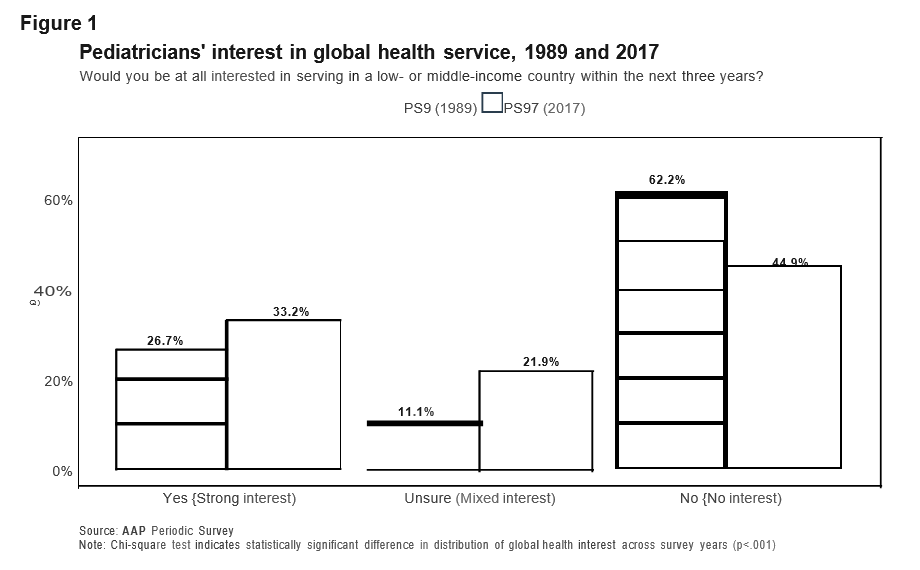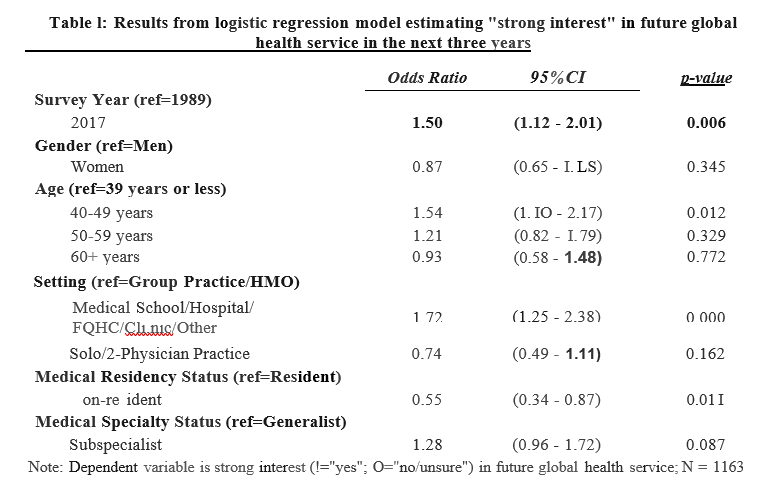Authors: Sisk, Blake1; Yun, Katherine3; Chan, Kevin2 Institutions:
- Research, American Academy of Pediatrics, Itasca, IL, United
- Pediatrics, Memorial University, St. John's, NF,
- PolicyLab, General Pediatrics, Children's Hospital of Philadelphia, Philadelphia, PA, United
Background: Even as awareness of global health has increased in pediatrics, little is known about trends in pediatricians’ interest and experience in global child health.
Objective: To examine trends in pediatricians’ interest and experience in global health from 1989 to 2017.
Design/Methods: Data from nationally representative surveys of American Academy of Pediatrics U.S. members in 1989 (n=709; response rate=71%) and 2017 (n=570; response rate=45%). Surveys collected information on past global health experience, interest in global health service, preferences for overseas global health service, and respondent demographics. Chi-square tests assessed the statistical significance of descriptive differences across survey years and a multivariable logistic regression model examined the independent effect of survey year on reporting interest in global health service (controls: gender, age, setting, medical residency status, and specialist status).
Results: The percent of pediatricians reporting global health experience in the past 12 months grew from 2.2% to 5.5% from 1989 to 2017 (p<.01). In 2017, pediatricians were more likely to report strong or mixed interest in global health service in the next 3 years; 55% had at least some interest in 2017, compared to 38% in 1989 (Figure 1; p<.001).
Among pediatricians with at least some interest in global health service (n=316 in 2017; n=265 in 1989), respondents in 2017 were more likely to indicate a preference for overseas service opportunities with a shorter time commitment than in 1989 (p<.001), and 83% in 2017 reported their first preference for overseas service was clinical care, compared to 70% in 1989 (p<.05).
Multivariable results indicated that, even when taking the changing demographic profile of pediatricians across survey years into account, pediatricians in 2017 were significantly more likely to report strong interest in future global health service (Table 1; AOR 1.50, 95% CI 1.12-2.01).
Conclusion(s): The percent of pediatricians reporting global health experience in the past 12 months increased from 1989 to 2017, and pediatricians in 2017 were substantially more likely to indicate strong interest in future global health service. These findings, along with the shifting preferences of pediatricians towards serving in a clinical care capacity for a shorter time commitment, suggest that more global child health service opportunities are needed that fit the preferences of today’s pediatric workforce and the needs of international partners.


Last Updated
10/26/2021
Source
American Academy of Pediatrics